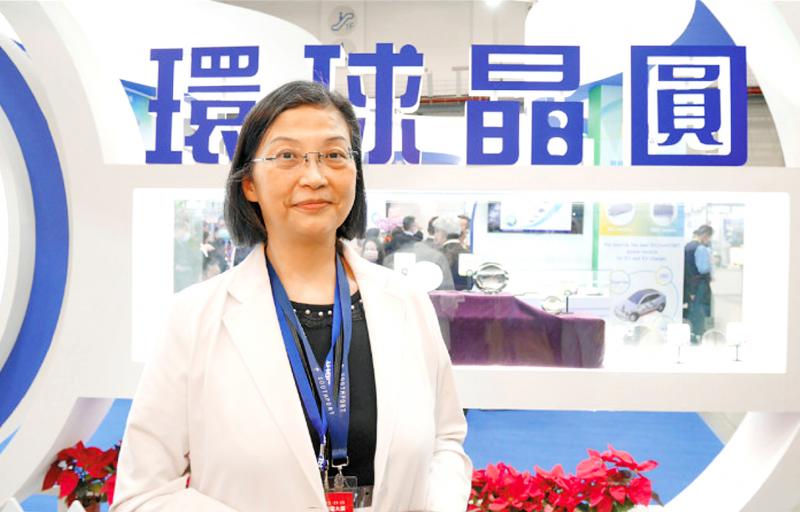GlobalWafers Inc (環球晶圓), the world’s No. 3 silicon wafer supplier, yesterday reiterated its positive outlook on business until 2025, as customers continue to show a strong interest in securing wafer supply by signing long-term supply agreements (LTAs).
The Hsinchu-based company saw prepayments from LTAs swell to a record NT$33.11 billion (US$1.12 billion), up 15 percent from the end of last year, undeterred by growing uncertainty about macro environmental risks including impact from COVID-19 lockdowns, the Russia-Ukraine war, rising interest rates, and higher energy and freight costs.
“We continue to sign LTA contracts, especially for larger diameter wafers and advanced products, with 300-millimeter wafers being our customers’ primary target,” GlobalWafers chairperson Doris Hsu (徐秀蘭) told investors at a teleconference.

Photo: Fang Wei-jie, Taipei Times
“We have yet to see a cooling-off in demand from our customers,” Hsu said.
“There is some unevenness in the end market, with demand from the smartphone and notebook markets, for example, slowing slightly, while demand from the automotive, industrial and server markets continue to be very hot,” she added.
“So far, there has been no order cancelation or pushout from our customers,” she added.
Demand is strongest for all types of 300-millimeter wafers, followed by wafers made of compound semiconductor materials, mainly silicon carbide and gallium nitride, GlobalWafers said.
To satisfy the robust demand, the company said it was maintaining its NT$100 billion capacity expansion plan, which includes brownfield and greenfield projects at six sites in Taiwan, the US, Italy, South Korea, Japan and Denmark.
Much longer lead times in equipment delivery could create a bottleneck, and that could lead to a delay of one to two quarters in the construction of new production lines, Hsu said.
All production lines are running at full capacity, she said.
In the first quarter, GlobalWafers’ net profit plunged 35 percent year-on-year to NT$1.75 billion, dragged by a loss of more than NT$6 billion from a drop in 13.67 percent-held Siltronic AG’s market value and foreign exchange rate fluctuations.
That translated into earnings per share of NT$4.01, down from NT$6.18 a year earlier.
Excluding the unrealized losses from Siltronic, GlobalWafers would have seen a record profit of NT$14.16 per share last quarter, the company said.
Operating profit surged 49 percent to NT$5.89 billion, and gross margin improved to a record 42.6 percent, from 35.1 percent a year ago.
GlobalWafers said it is hard to predict whether its gross margin would be able to rise to the levels — 46 or 48 percent — posted by foundry companies or integrated device manufacturers, given the uncertainty arising from the impending imposition of a carbon emissions tax and higher energy costs.
Wafer manufacturing is a power-intensive industry, the company said.

Hon Hai Precision Industry Co (鴻海精密) yesterday said that its research institute has launched its first advanced artificial intelligence (AI) large language model (LLM) using traditional Chinese, with technology assistance from Nvidia Corp. Hon Hai, also known as Foxconn Technology Group (富士康科技集團), said the LLM, FoxBrain, is expected to improve its data analysis capabilities for smart manufacturing, and electric vehicle and smart city development. An LLM is a type of AI trained on vast amounts of text data and uses deep learning techniques, particularly neural networks, to process and generate language. They are essential for building and improving AI-powered servers. Nvidia provided assistance

DOMESTIC SUPPLY: The probe comes as Donald Trump has called for the repeal of the US$52.7 billion CHIPS and Science Act, which the US Congress passed in 2022 The Office of the US Trade Representative is to hold a hearing tomorrow into older Chinese-made “legacy” semiconductors that could heap more US tariffs on chips from China that power everyday goods from cars to washing machines to telecoms equipment. The probe, which began during former US president Joe Biden’s tenure in December last year, aims to protect US and other semiconductor producers from China’s massive state-driven buildup of domestic chip supply. A 50 percent US tariff on Chinese semiconductors began on Jan. 1. Legacy chips use older manufacturing processes introduced more than a decade ago and are often far simpler than

STILL HOPEFUL: Delayed payment of NT$5.35 billion from an Indian server client sent its earnings plunging last year, but the firm expects a gradual pickup ahead Asustek Computer Inc (華碩), the world’s No. 5 PC vendor, yesterday reported an 87 percent slump in net profit for last year, dragged by a massive overdue payment from an Indian cloud service provider. The Indian customer has delayed payment totaling NT$5.35 billion (US$162.7 million), Asustek chief financial officer Nick Wu (吳長榮) told an online earnings conference. Asustek shipped servers to India between April and June last year. The customer told Asustek that it is launching multiple fundraising projects and expected to repay the debt in the short term, Wu said. The Indian customer accounted for less than 10 percent to Asustek’s

Gasoline and diesel prices this week are to decrease NT$0.5 and NT$1 per liter respectively as international crude prices continued to fall last week, CPC Corp, Taiwan (CPC, 台灣中油) and Formosa Petrochemical Corp (台塑石化) said yesterday. Effective today, gasoline prices at CPC and Formosa stations are to decrease to NT$29.2, NT$30.7 and NT$32.7 per liter for 92, 95 and 98-octane unleaded gasoline respectively, while premium diesel is to cost NT$27.9 per liter at CPC stations and NT$27.7 at Formosa pumps, the companies said in separate statements. Global crude oil prices dropped last week after the eight OPEC+ members said they would